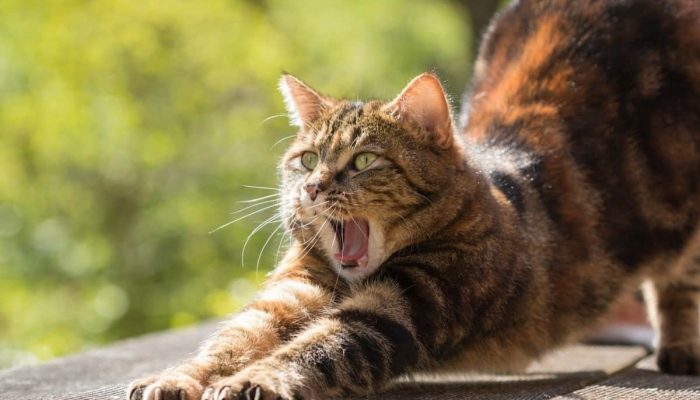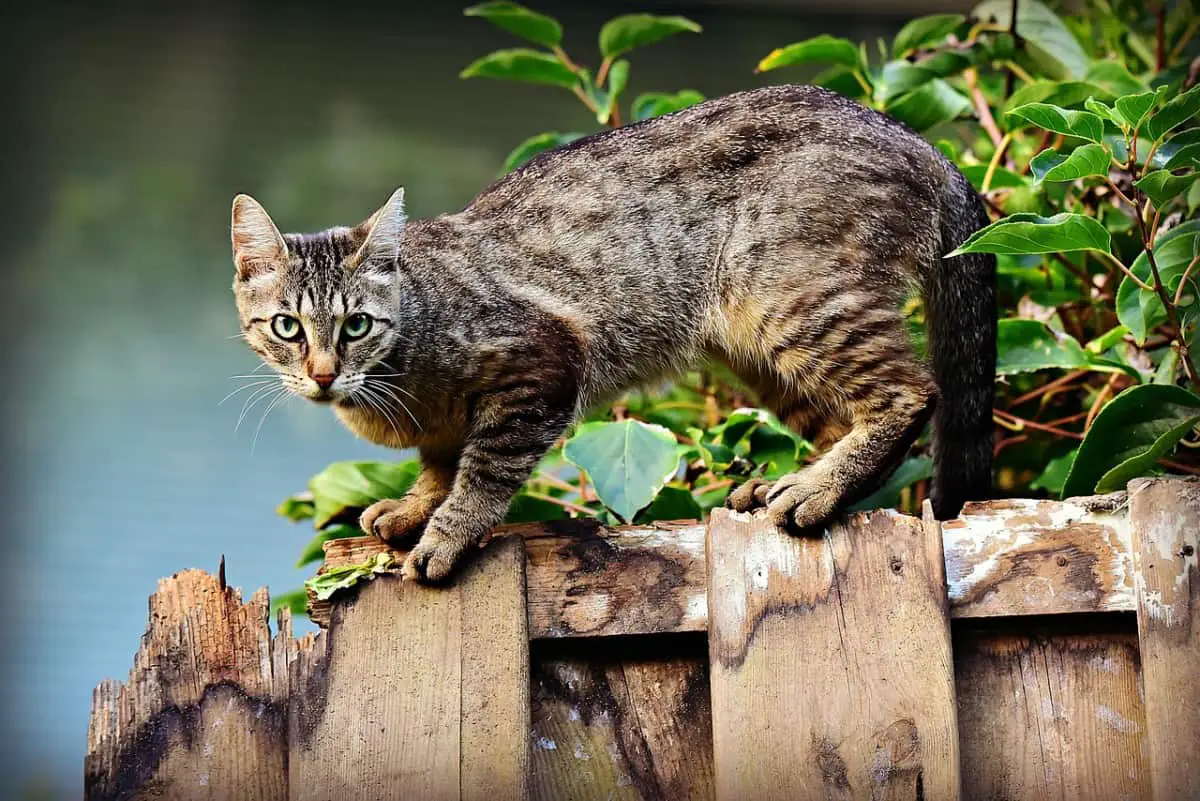For animal lovers, witnessing a catfight can be incredibly concerning, particularly when it appears to be escalating to a severe degree. While it’s common for cats to fight or display aggression, will domestic cats fight to the death?
Domestic cats are not likely to fight to the death. However, catfights may escalate to the extent where serious harm can be done, depending on the fight’s cause and the relationship between the participants.
Catfights are a normal aspect of feline behavior, as it is part of their natural and primal instincts. That being said, caregivers need to understand common causes to avoid dismal outcomes. Stick around to find out why domestic cats fight, how to avoid fights, and how to go about breaking up a catfight when it’s getting out of hand.

Will Domestic Cats Fight to the Death?
No, domestic cats are unlikely to fight to kill or even to cause severe harm. This is since cats still have altercations with each other, which they resolve in their own way. But, the reason for the fight will have a great influence on the risk of serious physical harm being done and how quickly the fight will resolve itself, if at all.
Reasons for Cat Fights
It may seem like cat fights start out of absolutely nowhere, but there are usually indicators before the claws come out. This includes growl-like sounds, hissing, and overall body language, and these signs can give insight into the potential cause of the fight breaking out.
Territorial Behavior
It’s very common for cats to begin fighting when they are unfamiliar with each other and assume that they need to defend their turf. This is common when domestic cats encounter outdoor cats or other domestic cats in the area and feel that they need to fight to make their territorial authority known.
Such a scenario can happen in the home as well, amongst cats who are familiar with each other and are otherwise friendly. In these cases, the odds are that one of the cats has intruded on another’s dominance, which is common in the presence of alpha cats.
Aggressive Behavior
Some cat breeds are timid while others are more aggressive; thus some are more prone to fighting than other breeds. Such instances may be triggered by incompatible behavior, such as one cat wanting to play and cuddle and the other receiving this interaction as disrespectful or annoying.
Cat fights as a result of aggressive behavior are particularly common with male cats and alpha cats. During heat, cats may also show more aggression than usual, or males may portray aggressive behavior towards females to establish dominance over them.
In some cases, cats may appear to be fighting but are actually playing rough. While there is potential for these wild play sessions to escalate into a full-blown catfight, the odds of this are less likely as they may still be learning boundaries with each other. Still, owners should always keep an eye out for playtime that appears to be getting out of hand, as there is still the risk of harm being done unintentionally.
Do Cats Hurt Each Other When They Fight?
Cats may harm each other to varying degrees based on the cause for the fight, and the relationship that they have with each other. Intentional harm is far more common in cases where cats are fighting due to defensive and territorial behavior, especially with unfamiliar cats or when the encounter occurs outdoors.
In cases where dominance or boundaries need to be communicated between domestic cats within the same home or neighborhood, it’s more common for the altercation to continue until the issue resolves itself or one of the cats submits to the other. This is usually indicated by one of the cats backing off, laying down, or sitting down, which usually gratifies the dominant cat enough to return to their usual behavior.
Cats usually prowl and use their paws to smack each other initially, which is telling of their intent. Only after some time of the fight escalating, they may whip out the claws or begin biting each other, which is more common when cats become defensive of their territory or loved ones. An example of such a case would be when a foreign male cat approaches a domesticated female cat only to be met with an alpha cat standing guard on the property.
Why Do Cats Fight At Night?
Cats fight at varying points throughout the day, but it is far more common for them to fight at night. Many cats roam at night for various reasons, and the odds of them encountering each other at night are higher which means there is a greater likelihood of fights breaking out.
In addition, the overall lack of activity and human interference makes it easier for cats to resolve the issue through fighting, particularly when it is related to dominance or territory. However, catfights at night are far more common with outdoor cats compared to domesticated cats for this reason.
How To Stop Cats From Fighting
If it becomes clear that the cat fight is escalating, caregivers may need to intervene for the safety of all cats involved. However, it’s important to note that they will already be aggressive at the moment, and it is possible for those breaking up the fight to be harmed in the process.
Thus, stopping a cat fight needs to be done safely for the cats and you. Always use gentle measures which do not scare or stress out the cats, and always keep a safe distance from them while they are aggressive.
Break Up Cat Fights With Water
One can use water spray or low-pressure water guns to spray near the cats while they are fighting. This should cause them to pause, which may result in the altercation de-escalating naturally. However, do not wet cats when it is cold or at night, making them sick.
Use Distractions
Cats get distracted very easily, and one can use safe lasers, toys, music, loud noises, or even treats to take their mind off the altercation. In most cases, the cats may become more interested in these distractions than the initial fight, causing it to de-escalate.
How To Stop My Cat From Bullying My Other Cat
While cat fights are concerning in general, witnessing multiple cats that you love dearly and equally is certainly far more worrying and perplexing. Of course, you wouldn’t want harm to come to any of them, but you will need to ensure you are protected and preserve healthy relationships. Similar methods can be used to break up fights once they have started, but the best approach is to set up means to avoid such instances overall.
Ensure Each Cat Is Happy and Entertained
Every cat is unique in temperament and personality, depending on the breed’s inherent traits and its distinct character. Such traits may clash with that of other cats in the home, resulting in them fighting.
Always ensure that each cat has means to keep them in a good mood, such as toys, freshwater, tasty treats, a healthy dose of physical activity, and an abundance of love in ways that they enjoy receiving it. These aspects will ensure they are engaged and occupied, reducing stress, alleviating built-up energy or tension, and decreasing the likelihood of fights.
Provide Your Cats With Privacy
Cats are certainly sociable, but they do require time to themselves. If they are not provided with space to recline and relax in peace, they may begin exhibiting aggression to other cats in the home. Ensure that they have beds, cat perches, scratching posts, and cat trees with enough room for everyone to enjoy equally. Stress-reducing pheromones can be sprayed on these accessories to reduce aggressive behavior as well.
Alpha Cat Behavior
If you own an alpha cat, it’s quite understandable for them to exert dominance and territorial behavior in the home. This process can be aided by support from owners and the provision of their own space and training since alpha cats generally warm up to other cats in the environment once their dominance is understood and respected.
Socialization Issues
If your cat has had minimal or poor social interaction with other animals from when they are young, they may lash out and become jealous or aggressive. It’s always important to ensure your cat is well-adjusted with others from childhood to ensure they grow into sociable adult cats. Choosing breeds with compatible traits is always more constructive in this process.
While catfights can be worrying and confusing to observe, caregivers need to be mindful of cats’ social customs and methods. In most cases, cat fights tend to subside once the issue has been resolved, but some altercations may require suitable and secure human intervention to avoid grim outcomes. If your cat has severely aggressive behavior issues, a vet or animal behaviorist may be necessary to find a suitable long-term solution.











